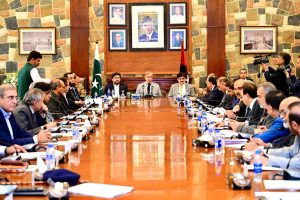The recent meeting between Prime Minister Shehbaz Sharif and Pakistani business leaders was marked by a sense of urgency and a need for bold action. The business community laid out a long list of challenges that have made it increasingly difficult to do business in Pakistan, including inconsistent economic policies, political instability, high costs, and a lack of foreign direct investment.
Despite these daunting obstacles, the government’s efforts to stabilize the economy and engage with the IMF for a new bailout program were appreciated. However, the business leaders called for two major initiatives that they believe could truly uplift the economy.
Firstly, they urged the prime minister to reconcile with the opposition parties, recognizing that political unity is crucial for economic progress. As Arif Habib, the chief of Arif Habib Group, aptly stated, “You have made a few handshakes after taking the charge that has produced good results, and progress on the International Monetary Fund (IMF) deal is one of them. I suggest you do a few more handshakes.”
Secondly, and perhaps more controversially, the business community called for the government to open trade talks with India. Habib argued that such a move would “greatly benefit our economy,” acknowledging the complexities involved but underscoring the potential economic rewards.
While the first suggestion of reconciling with the opposition may be within the prime minister’s reach, the prospect of engaging with India on trade is a delicate and politically charged issue. However, if Pakistan truly aspires to revive its economy, it must be willing to explore all avenues, even those that may seem daunting or unconventional.
Pakistan has little room to openly pursue ties with India and repair trade and diplomatic connections without coming under fire from the general public as a result of its confrontational approach over the years towards New Delhi. But with the economy in ruins, Pakistan would have to think outside the box.
One such idea is to start economic negotiations with India without requiring that the Kashmir dispute be resolved first. Kashmir is a contentious issue between Pakistan and India that has led to three major wars as well as fierce contention between the two nations.
Pakistan suspended trade with India in 2019 due to New Delhi’s decision to scrap the special status accorded to Jammu and Kashmir under Article 370 of the Indian Constitution.
For the year 2018-2019, Pakistan’s trade with India amounted to $324 million in exports while imports were worth $1.8 billion, according to its commerce ministry.
There is, however, huge potential for increasing these numbers. The World Bank estimates Pakistan’s exports can increase by 80 percent if it had a normal trade relationship with India, increasing GDP and employment. Approximately 85 percent of Pakistan’s unrealized trade potential is attributed to India, according to another World Bank study.
Given that the Pakistani economy is in free fall, trade with India could prove very valuable, and it seems Pakistan is taking note of this potential. Foreign Minister Ishaq Dar announced earlier this month that he had begun discussions with stakeholders about restoring trade relations with India.
Trade ties with India could also lead to a broader rapprochement between the two countries and help Pakistan’s economy stabilize. The decision on Pakistan’s part, however, may not be popular, as the country has invested years in condemning India.
Pakistani policymakers had previously made communication with India possible despite outstanding issues. This can be repeated if all the important actors in the country, particularly the military leadership, give their consent.
A consensus on initiating discussions with India is critical for any Pakistani government. In the past, Pakistan’s internal decision-making process, which lacked consensus over the issue of engaging with India, weakened elected governments. It will be crucial that this issue is resolved before the government tries to get in touch with New Delhi.
The ball is now in the prime minister’s court. He should reach out to anyone and everyone to consult on the issue or bring on board.
The business leaders have spoken, and the path forward is clear: political unity and economic pragmatism must take precedence over partisan divides and historical grievances. Only then can Pakistan’s economy truly thrive and fulfill its immense potential.

































